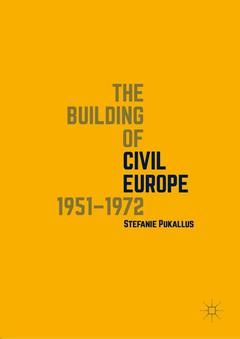The Building of Civil Europe 1951–1972, 1st ed. 2019
Langue : Anglais
Auteur : Pukallus Stefanie

This book argues that early European Commission officials envisaged an integrated civil Europe from the outset. Largely overlooked is the fact that between 1951 and 1972 there was a group of European Commission (and before that the High Authority) officials who wished to build a Civil Europe to sit alongside an economic and political Europe. This Civil Europe was, it was hoped, to become home to a European citizenry equipped with a European civil consciousness that complemented their national and local loyalties. To this end these officials pioneered a series of civil initiatives designed to begin the process of building Civil Europe. This book analyses three such civil initiatives: the building of the first European School, the European Community?s participation in Expo 58 and the production of the European Community?s own documentaries. From the start Europe was designed and conceived of in terms of a European general civil public and not solely in terms dictated by economic and political interests.
Introductory Statement.- Chapter 1 The European Commission officials and the Building of Civil Europe.- Chapter 2 Defining Civil Europe and European civil consciousness 1951-1972.- Chapter 3 Civil integration through education: the building of European Schools.- Chapter 4 Europe on display: the European Coal and Steel Community’s participation in Expo58.- Chapter 5 ‘Our Europe’: the representation of Civil Europe in the Community’s documentaries.- Conclusion: Civil Europe: The Fabulous Artificers, the European general public and complementary identities.- Index
Stefanie Pukallus is Lecturer at the University of Sheffield, UK, and Co-Director of Research at the Centre for Freedom of the Media (CFOM). Her research focuses on the civil dimension of European integration and its public communication. Previous publications include Representations of European Citizenship since 1951 (Palgrave, 2016).
Argues that the civil dimension of European integration was equal in importance to economic and political factors Takes a unique methodological approach, analysing over 400 political speeches made between 1951-1972 Evaluates the success and limitations of several key civil initiatives in practice
Date de parution : 12-2018
Ouvrage de 318 p.
14.8x21 cm
Thèmes de The Building of Civil Europe 1951–1972 :
© 2024 LAVOISIER S.A.S.



